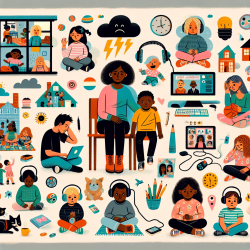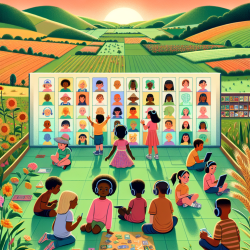Introduction
The COVID-19 pandemic has brought unprecedented challenges to families worldwide, particularly affecting children's social and emotional development. A recent study titled The impact of lockdown on child adjustment: a propensity score matched analysis offers valuable insights into how lockdown measures have impacted preschoolers' social adjustment and the mediating role of parent-child conflict. This blog will explore the study's findings and discuss how practitioners can apply these insights to improve outcomes for children.
Key Findings from the Study
The study utilized a Propensity Score Matching (PSM) method to compare pre-lockdown and post-lockdown groups, consisting of 574 preschoolers. The results highlighted several critical impacts of lockdown on children's emotional and social adjustment:
- Emotional Symptoms: The lockdown significantly increased emotional symptoms among children, such as anxiety and sadness.
- Parent-Child Conflict: The study found that increased parent-child conflict during lockdown mediated the relationship between lockdown and children's adjustment issues. This conflict exacerbated emotional symptoms, hyperactivity-attention problems, and reduced prosocial behaviors.
Implications for Practitioners
Understanding the mediating role of parent-child conflict provides practitioners with a targeted area for intervention. Here are some strategies practitioners can implement:
- Enhancing Parent-Child Communication: Encourage parents to engage in open and supportive communication with their children. This can help reduce misunderstandings and conflicts.
- Providing Parental Support: Offer resources and support to parents to help them manage stress and improve their parenting skills. This can include workshops, counseling, and access to parenting resources.
- Promoting Emotional Regulation in Children: Teach children emotional regulation techniques to help them manage their emotions effectively. This can include mindfulness exercises and coping strategies.
Encouraging Further Research
While the study provides valuable insights, further research is needed to explore the long-term effects of lockdown on child development and the potential for recovery. Practitioners are encouraged to contribute to this research by collecting data and sharing their observations and findings.
Conclusion
The lockdown has undeniably impacted children's social and emotional development, but by understanding and addressing the mediating role of parent-child conflict, practitioners can help mitigate these effects. By implementing the strategies outlined above, practitioners can support families in fostering healthier parent-child relationships and promoting better outcomes for children.
To read the original research paper, please follow this link: The impact of lockdown on child adjustment: a propensity score matched analysis.










